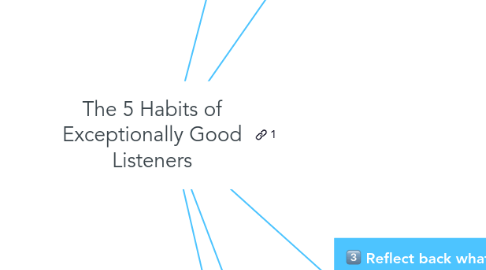The 5 Habits of Exceptionally Good Listeners
por Danny Forest


1. Focus on the person, not the problem
1.1. When people simply want to be heard, understood, and feel connected, problem-solving and advice-giving directly interferes
1.2. When someone is upset, the last thing they want is to feel like a burden or that something is wrong with them.
1.3. Don't give unsolicited advice to someone who’s struggling — you make them feel like a problem.
1.4. Give advice only when they ask for it
1.5. Until then, focus on just being present.
2. Ask open-ended questions
2.1. Be supportive, empathize, offer encouragement, and help them feel like you’ve got their back and that they’re not alone.
2.2. Open-ended questions communicate that you’re interested and care about the other person.
2.3. Closed questions communicate that you care about information.
2.4. Use open ended questions instead of closed questions
2.5. Here are a few generic open-ended questions
2.5.1. What was that like for you?
2.5.2. Can you tell me more about that?
2.5.3. How did you feel about that?
2.5.4. How are you feeling right now?
2.5.5. What was going through your mind?
2.6. When asking questions, avoid beginning with Why and use What or How instead
3. Reflect back what you’re hearing
3.1. Reflective listening means repeating back (often in your own words) what the person across from you has said
3.2. When we reflect back what another person is telling us, it shows them that we care and that we’re listening carefully.
3.3. Reflective listening makes people feel heard.
3.4. When people feel genuinely heard, all sorts of good things start to happen, no matter how bad the situation is.
4. Validate their emotions
4.1. When we validate their emotions, we send a powerful message that we understand them on a deep level and are with them.
4.2. Show that their emotions are valid.
4.3. From birth, most of us have been trained to see our own “negative” emotions as bad, something to be eliminated or fixed.
4.3.1. This creates deep anxiety and guilt in all of us.
